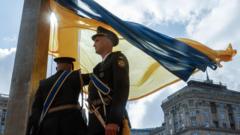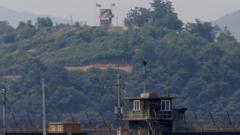In a heated diplomatic exchange, President Zelensky asserts that Russia is actively trying to derail peace efforts between him and Putin as the war continues.
**Zelensky Accuses Russia of Sabotaging Peace Talks Amid Ongoing Conflict**

**Zelensky Accuses Russia of Sabotaging Peace Talks Amid Ongoing Conflict**
Ukrainian President claims Russia is stalling negotiations while urging for security guarantees from Western allies.
In a recent address, Ukrainian President Volodymyr Zelensky has leveled serious accusations against Russia, claiming it is doing everything possible to obstruct peace talks aimed at ending the ongoing war. He voiced concerns that Russian leaders are not genuinely interested in negotiating, highlighting a clear divide in the diplomatic atmosphere. "Unlike Russia, Ukraine is not afraid of any meetings between leaders," he stated, expressing readiness for discussions.
Efforts for a potential summit between Zelensky and Russian President Vladimir Putin have been fostered by US President Donald Trump, who described the political dynamics as "like oil and vinegar... they don't get along too well." Russian Foreign Minister Sergei Lavrov has echoed skepticism, suggesting that the conditions for such a meeting are far from being met, pointing a finger at Zelensky's unreasonable demands and reluctance to engage.
Following a series of diplomatic meetings, which included Trump meeting with Putin in Alaska and subsequent discussions with Zelensky and European leaders, the US President acknowledged the immense challenges in resolving the conflict. Despite this, he expressed a commitment to arrange a summit that he plans to join. Zelensky has welcomed these efforts but emphasized the necessity of securing strong assurances from Western allies to safeguard Ukraine against future Russian aggression.
Joining Zelensky during a visit to Kyiv, NATO Secretary-General Mark Rutte noted that the alliance is actively collaborating with Ukraine to provide robust security guarantees, aiming to deter any future attacks from Putin. Rutte described this undertaking as significant yet complex, involving a revision of both the military and security dynamics surrounding Ukraine.
Despite the optimisms surrounding potential agreements, historical precedents weigh heavily on current developments. Previous security guarantees, like the 1994 Budapest Memorandum, have often been disregarded, raising legitimate doubts about their efficacy. Lavrov, while discussing recent encounters, reinforced these fears by stating that Russia has not made concessions, blaming Ukraine for failing to engage constructively in negotiations.
Meanwhile, amid these tensions, Russia launched a relentless barrage against Ukraine, further complicating peace prospects. A recent attack reportedly saw over 574 drones and 40 missiles deployed in a single night, escalating the urgency for resolution. Conversely, a Ukrainian drone attack targeting a Russian oil pumping station disrupted oil supplies critical to Hungary and Slovakia, leading to heightened diplomatic tensions.
As the conflict endures, Zelensky remains cautiously optimistic about the recent diplomatic landscape, recognizing that unity amongst allies can produce favorable outcomes. "This is much better than it was a week or two ago," he remarked, highlighting the importance of cohesive international support.
Ultimately, as both sides navigate this diplomatic quagmire, the future of peace talks remains uncertain, overshadowed by reciprocal accusations and military escalations.
Efforts for a potential summit between Zelensky and Russian President Vladimir Putin have been fostered by US President Donald Trump, who described the political dynamics as "like oil and vinegar... they don't get along too well." Russian Foreign Minister Sergei Lavrov has echoed skepticism, suggesting that the conditions for such a meeting are far from being met, pointing a finger at Zelensky's unreasonable demands and reluctance to engage.
Following a series of diplomatic meetings, which included Trump meeting with Putin in Alaska and subsequent discussions with Zelensky and European leaders, the US President acknowledged the immense challenges in resolving the conflict. Despite this, he expressed a commitment to arrange a summit that he plans to join. Zelensky has welcomed these efforts but emphasized the necessity of securing strong assurances from Western allies to safeguard Ukraine against future Russian aggression.
Joining Zelensky during a visit to Kyiv, NATO Secretary-General Mark Rutte noted that the alliance is actively collaborating with Ukraine to provide robust security guarantees, aiming to deter any future attacks from Putin. Rutte described this undertaking as significant yet complex, involving a revision of both the military and security dynamics surrounding Ukraine.
Despite the optimisms surrounding potential agreements, historical precedents weigh heavily on current developments. Previous security guarantees, like the 1994 Budapest Memorandum, have often been disregarded, raising legitimate doubts about their efficacy. Lavrov, while discussing recent encounters, reinforced these fears by stating that Russia has not made concessions, blaming Ukraine for failing to engage constructively in negotiations.
Meanwhile, amid these tensions, Russia launched a relentless barrage against Ukraine, further complicating peace prospects. A recent attack reportedly saw over 574 drones and 40 missiles deployed in a single night, escalating the urgency for resolution. Conversely, a Ukrainian drone attack targeting a Russian oil pumping station disrupted oil supplies critical to Hungary and Slovakia, leading to heightened diplomatic tensions.
As the conflict endures, Zelensky remains cautiously optimistic about the recent diplomatic landscape, recognizing that unity amongst allies can produce favorable outcomes. "This is much better than it was a week or two ago," he remarked, highlighting the importance of cohesive international support.
Ultimately, as both sides navigate this diplomatic quagmire, the future of peace talks remains uncertain, overshadowed by reciprocal accusations and military escalations.


















